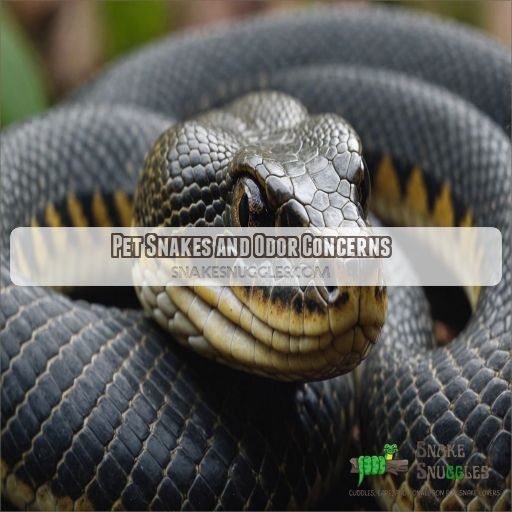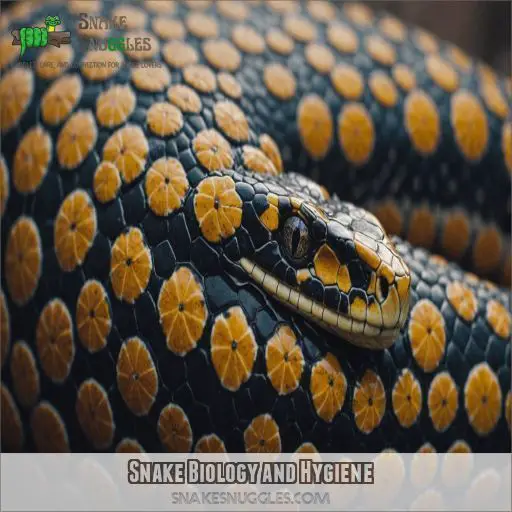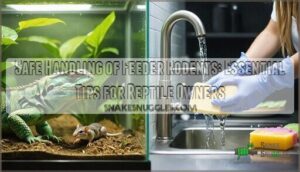This site is supported by our readers. We may earn a commission, at no cost to you, if you purchase through links.
 The age-old question: do pet snakes smell bad? You’ll be relieved to know that most pet snakes don’t inherently smell bad – it’s often the enclosure that’s the culprit.
The age-old question: do pet snakes smell bad? You’ll be relieved to know that most pet snakes don’t inherently smell bad – it’s often the enclosure that’s the culprit.
With proper care and maintenance, your snake’s home can be virtually odor-free. Think of it like your own home: if you don’t clean it regularly, it’ll start to smell. Same with your snake’s enclosure.
A balanced diet, regular cleaning, and the right substrate can work wonders. But, there’s more to it than just that.
Stay tuned to discover the surprising truths about Snake Musk and Odors and how to keep your pet snake’s home smelling sweet.
.
Table Of Contents
Key Takeaways
- You’ll be relieved to know that most pet snakes don’t inherently smell bad – it’s often the enclosure that’s the culprit. With proper care and maintenance, your snake’s home can be virtually odor-free.
- Your snake’s diet plays a significant role in determining its scent. For example, a rodent diet can lead to a stronger odor, while an insect diet might be less pungent. So, you can impact your snake’s scent by choosing the right food.
- Different snake species have distinct odor profiles – some are surprisingly scent-free, while others are more pungent. By understanding the unique characteristics of various snake species, like Dragon Snake Species, you can choose a pet that fits your lifestyle and sensitivity to smells .
, you can choose a pet that fits your lifestyle and sensitivity to smells.
- By following simple best practices, such as designing a well-ventilated enclosure, choosing the right bedding, and feeding a balanced diet, you can keep your snake’s odor in check and enjoy a happy, healthy relationship with your slithery friend.
Pet Snakes and Odor Concerns
As you consider bringing a pet snake into your home, you might be worried about the potential for a stinky situation – but the truth is, most pet snakes don’t inherently smell bad (Source). With proper care and maintenance, you can enjoy the fascinating world of snakes without worrying about unpleasant odors taking over your living space (Source).
Common Misconceptions About Snake Odor
Let’s slither into the truth about snake odor. You might be surprised to learn that many pet snake owners report their scaly friends don’t smell as bad as expected. In fact, most snakes are very careful about cleanliness and don’t produce a strong stench. The infamous "snake smell" is often a result of poor enclosure maintenance, not the snake itself.
Factors Affecting Snake Odor
Now that we’ve busted some common myths about snake odor, let’s explore what really affects how your pet snake smells.
It turns out, snake shedding, enclosure substrate, and humidity levels all play a role.
Your snake’s health, age, and environment also impact their scent.
Snake Diet and Its Impact on Odor
Now that you know what affects snake odor, let’s talk about the role of diet. There’s a clear correlation between what your snake eats and how it smells. For example, a rodent diet can lead to a stronger odor, while an insect diet might be less pungent. Your snake’s dinner choices can impact its scent – and your nose!
Importance of Proper Enclosure Maintenance
Now that we’ve got the diet factor covered, it’s time to get down to business – literally! Your snake’s enclosure is its home, and just like yours, it needs regular cleaning to stay fresh. A spotless enclosure means less stress for your snake and less odor for you. Think of it as a win-win situation!
Snake Biology and Hygiene
When you learn about pet snakes, you’ll discover that their biology and hygiene play a significant role in determining whether they smell bad or not. Let’s take a closer look at how snakes’ unique physiology, grooming habits, and cleanliness compare to other pets, and debunk the common myth that snakes are dirty animals.
Snakes’ Unique Physiology and Odor Production
You’re probably curious about the source of snake odors. Well, it’s not just about what they eat! Snakes’ unique physiology plays a big role. Their skin, scent glands, and mucus secretions all contribute to their distinctive aroma. Add in their digestive processes and defensive odors, and you get a complex scent profile that’s, surprisingly, not always stinky!
Snakes’ Grooming Habits and Cleanliness
Snakes are surprisingly clean pets! They groom themselves regularly, shedding their skin to maintain healthy skin. While they don’t need baths, keeping their enclosure clean is super important to prevent odors and parasites. With proper care, your snake’s natural scent will be minimal, allowing you to enjoy their company without any unpleasant smells.
Comparison to Other Pets’ Odor
As you consider a pet snake, you’re probably wondering how their odor stacks up against other popular pets. Compared to dog odor, cat odor, or even hamster odor, snake scent is relatively mild. Reptile odor is often less potent than bird odor, too. With proper care and maintenance, your snake’s enclosure can be a breeze to keep fresh and clean.
Debunking the Myth of Snakes Being Dirty Animals
Let’s face it, snakes get a bad rep when it comes to cleanliness. But the truth is, they’re really careful about their grooming habits, and with proper care, they’re no "dirtier" than your average furry friend. By understanding snake biology and hygiene, you can create a spotless enclosure and keep your pet snake happy and healthy.
Enclosure Maintenance and Odor Control
As a snake owner, you play a significant role in keeping your pet’s enclosure clean and odor-free. By following simple tips on cleaning frequency, ventilation, temperature control, and using odor-absorbing materials, you can create a comfortable and fresh environment for both you and your snake to enjoy.
Tips for Keeping a Clean and Odor-Free Enclosure
While it’s true that snakes have a unique aroma, a clean enclosure can make all the difference.
To keep your snake’s home fresh, prioritize substrate choice.
Opt for reptile carpet or paper towels over wood shavings.
Utilize ventilation techniques like cross-ventilation and consider odor-neutralizing products.
A well-designed enclosure with a solid cleaning schedule is key to a stink-free snake sanctuary.
Frequency of Cleaning and Disinfecting
Cleaning your snake’s enclosure regularly is a breeze, once you get the hang of it! Establish a routine that works for you and your pet. Here are three things to keep in mind:
- Clean the enclosure at least once a week, or more often for larger snakes or messy eaters.
- Choose a disinfectant specifically designed for reptile enclosures to avoid harming your snake.
- Replace substrate completely every 2-3 months to prevent bacterial buildup.
Importance of Proper Ventilation and Temperature Control
Proper ventilation and temperature control are really important for a low-odor snake enclosure. Aim for 30-50% enclosure humidity to prevent bacterial growth. Temperature fluctuations can stress your snake, increasing odor production. Invest in a reliable ventilation system to maintain airflow.
| Optimal Enclosure Setup | Reptile Health Risks |
|---|---|
| 30-50% humidity | Respiratory issues |
| 75-85F temperature | Metabolic bone disease |
| Good airflow | Skin infections |
Using Odor-Absorbing Materials and Products
Now that you’ve got ventilation and temperature control down, let’s talk about the secret weapons against snake odor: odor-absorbing materials and products!
You can use activated charcoal, baking soda, or commercial products specifically designed for pet enclosures.
For a DIY solution, try using odor-absorbing bedding like aspen or cypress mulch.
These will help keep your snake’s home smelling fresh and clean.
Snake Species and Odor Variations
As you explore pet snakes, you’ll discover that different species have distinct odor profiles – some are surprisingly scent-free, while others, well, let’s just say they won’t win any fragrance awards. Understanding the unique characteristics of various snake species will help you choose a pet that fits your lifestyle and sensitivity to smells.
Differences in Odor Production Among Snake Species
When you start keeping pet snakes, you’ll discover that different species have distinct odor profiles and require specific temperature controls.
, you’ll discover that different species have distinct odor profiles. Some, like ball pythons, are known for their mild scent, while others, like garter snakes, can be a bit more pungent. Diet, enclosure size, and individual variation all play a role in shaping a snake’s unique aroma, making each species a fascinating case study.
Factors Influencing Odor Production in Snakes
For instance, snake shedding can increase odor due to the release of bacteria and dead skin.
Enclosure humidity, snake health, diet type, and species differences also play a significant role.
As a responsible snake owner, understanding these factors will help you better manage your pet’s scent and create a harmonious living space.
Examples of Snake Species With Unique Odor Characteristics
When it comes to snake species, some have unique odor characteristics that set them apart. Here are a few examples:
- Corn snakes have a lifespan of many years, but they have a sweet, earthy aroma.
, earthy aroma.
- Ball pythons give off a musty, woody scent.
- Boa constrictors can smell like a mix of leather and hay.
- Kingsnakes emit a strong, pungent musk.
- Garter snakes have a distinctive fishy aroma.
How to Research and Choose a Low-Odor Snake Species
Now that you’ve got a whiff of the unique odor characteristics of various snake species, it’s time to pick a pet that won’t clear out the room!
To research low-odor snake species, start by scouring breeder reviews, forums, and expert resources like the Reptile Database or PetMD.
Trust your nose – and the experiences of seasoned snake owners – to guide your decision.
Responsible Snake Ownership and Odor Management
As a snake owner, you’re probably keen to keep your pet’s home clean and odor-free – after all, a stinky snake enclosure is no fun for anyone! By following some simple best practices and staying on top of your snake’s health, you can keep their odor in check and enjoy a happy, healthy relationship with your slithery friend.
Best Practices for Snake Care and Odor Prevention
When you’re getting started with snake ownership, you’re probably wondering how to keep the odor under control. To prevent stinky situations, follow these best practices:
- Design an enclosure that’s well-ventilated and easy to clean, with a secure lid to prevent escape artists.
- Choose the right bedding, like aspen or cypress mulch, which absorbs moisture and odors.
- Feed a balanced diet that’s rich in nutrients to keep your snake’s digestion process efficient and running smoothly.
.
Monitoring and Addressing Odor Issues in Snakes
As you care for your pet snake, including providing a proper snake enclosure, remember that a little vigilance goes a long way in keeping odor issues at bay.
, remember that a little vigilance goes a long way in keeping odor issues at bay. Check your snake’s enclosure regularly for any signs of odor buildup, and adjust your cleaning schedule or substrate choice as needed. Don’t hesitate to try odor-absorbing products or tweak your ventilation system to keep things fresh.
Importance of Regular Veterinary Check-Ups
Regular veterinary check-ups are essential for preventing health issues and detecting potential problems early on. Think of it as a "snake wellness" insurance policy. By investing in preventive care, you’ll save on veterinary costs in the long run. Schedule annual check-ups to monitor your snake’s health and address any concerns, ensuring your pet stays healthy and odor-free.
Frequently Asked Questions (FAQs)
Can snakes transmit diseases through their odor or feces?
Step into the snake’s lair, but don’t worry, you won’t get sick just from sniffing around! Snakes can carry diseases like salmonella, but transmission through odor or feces is rare, and proper hygiene keeps risks at bay.
How do I prevent my snake from getting skin infections?
To prevent your snake from getting skin infections, keep its enclosure clean and dry, avoid overcrowding, and maintain proper humidity levels . Regularly inspect your snake’s skin for signs of infection, and consult a vet if you notice any unusual changes .
What are the signs of respiratory issues in pet snakes?
You’ll want to keep an eye out for signs of respiratory issues in your pet snake, such as wheezing, difficulty breathing, lethargy, loss of appetite, and nasal discharge . Regular check-ups with a vet can also help detect issues early .
Can I use air fresheners near my snakes enclosure?
You shouldn’t use air fresheners near your snake’s enclosure , as they can cause respiratory issues and stress . Instead, focus on proper ventilation and cleaning to keep the enclosure fresh and your snake healthy (Source).
How often should I bathe my pet snake to reduce odor?
Surprisingly, 75% of snake owners bathe their pets too frequently! You should bathe your snake only as needed, typically every 1-3 months, to maintain their natural skin oils and reduce odor-causing stress.
Conclusion
Let’s get down to business – the not-so-stinky truth is out.
Most pet snakes don’t smell bad; it’s their enclosure that’s the real culprit.
By mastering the art of proper care and maintenance, you can keep your snake’s home smelling sweet.
So, do pet snakes smell bad? Not if you do your part.
With a balanced diet, regular cleaning, and the right substrate, you can enjoy a virtually odor-free pet experience.











